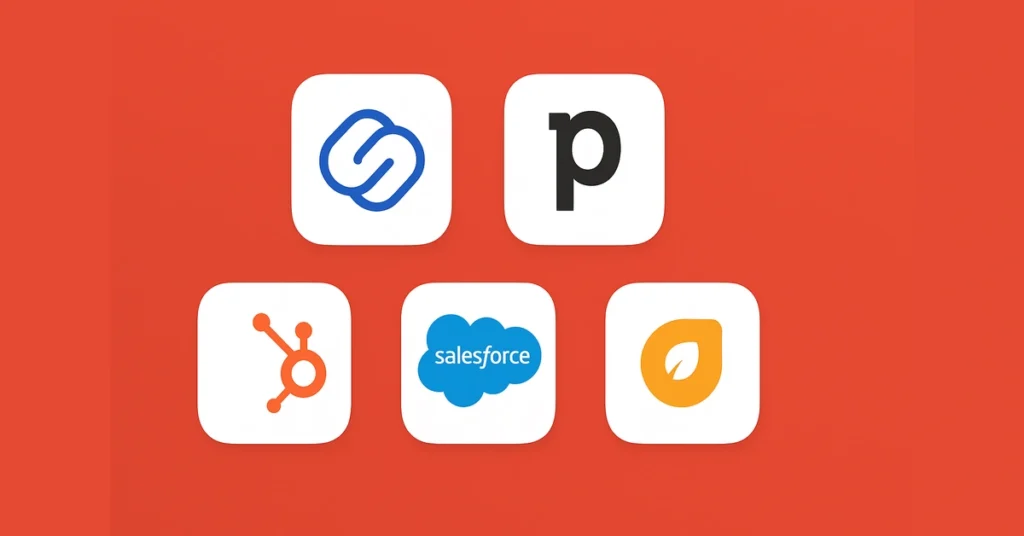If you’re still tracking customers in spreadsheets and losing deals because you forgot to follow up, you’re bleeding money. Every day you delay implementing a proper CRM system, you’re watching potential revenue walk out the door.
I’ve been testing Best CRM for small businesses for 2 months now, and here’s what I discovered: Zoho CRM takes the top spot for its affordable $14/month pricing and surprisingly full-featured toolkit. Pipedrive comes second for sales teams—their visual pipeline just works. And for those who want a free option, HubSpot is still a solid pick with its user-friendly interface.
After spending countless hours testing them, I found that a CRM can seriously change how you manage your customers. According to zippia statistics 45% of companies improved their sales revenue using CRM software, and the average return is $8.71 for every dollar spent. That’s real money back in your pocket.
The challenge for small business owners is finding the right tool that’s powerful enough to help you grow but simple enough that you’ll actually use it. That’s exactly what I focused on during my testing. I wanted tools real small business owners would love, not just tolerate.
This guide cuts through the marketing fluff to show you exactly which CRMs work for real small businesses. You’ll discover which platforms deliver the best ROI, which ones will frustrate your team, and how to avoid expensive mistakes that could cost you thousands.
The 7 best CRM for small business
- Zoho CRM – for All-in-One business suite
- Pipedrive – for sales teams overall
- HubSpot – free option with powerful features
- Freshsales – for customer service integration
- Capsule CRM – for simplicity and clean design
- Agile CRM – for marketing automate
- Salesforce – for enterprise-level growth (But Probably Overkill)
Table of Contents:
1. Zoho CRM: Best all-in-one CRM suite for small business
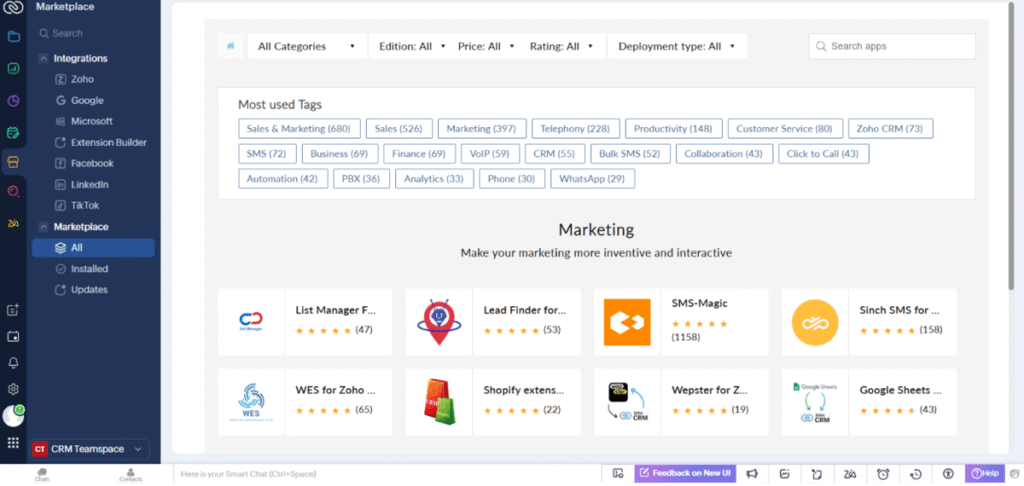
If you’re paying for separate apps for email, accounting, project management, and CRM, you’re probably spending more than you need to. Zoho fixes this expensive problem by putting everything under one roof. And it offers comprehensive customer relationship management software at an affordable price—just $14/month, which makes it one of the best CRMs for small business.
You might think switching between different apps all day is normal for business. But what’s important is how much time your teams waste logging into multiple systems. and how much money you’re bleeding on subscription fees.
Here’s what makes Zoho different from other CRMs: it’s part of a complete business ecosystem. You can manage your sales pipeline, send invoices, track projects, and handle customer support without leaving the platform. That’s why I recommend it for businesses that want to consolidate their tool stack.
What works best for me is their AI assistant Zia—it actually provides useful insights about deal probability and suggests next actions. And the integration with other Zoho apps creates a complete business suite for your growing business. If you’re curious about other AI-powered software that can boost your workflow, check out our guide on the best AI tools.
The good stuff starts happening when you realize your CRM talks to your accounting software automatically. When you close a deal in Zoho CRM, it can create an invoice in Zoho Books instantly. Your customer data flows between all your business functions without manual entry.
Here’s what you get for your business:
- Sales automation that actually works with your other business processes
- Email integration that captures every customer conversation
- Workflow automation that reduces your team’s repetitive tasks
- Mobile apps that keep you connected when you’re out of the office
- Analytics that show you patterns across your entire business
Zoho CRM Pros & Cons
Pros:
- One login for your entire business operation
- Great free plan for teams of up to 3 people
- Strong automation features that save your team hours daily
- Highly customizable options that fit your specific industry needs
- Multi-Channel Communication
Cons:
- AI features only on high tiers
- Learning curve is steep when you use multiple Zoho apps
- Advanced features behind higher tiers
Zoho CRM pricing
Free plan available, for 3 user. Standard plan starts at $14 per user monthly. Professional tier at $23 gives you better automation and customization. But here’s the real value—you can add Zoho Books, Projects, and other apps for just a few dollars more each.
Should Your Business Choose Zoho?
You should choose Zoho if you’re currently paying for multiple business tools that don’t talk to each other. It’s particularly powerful if you need CRM plus accounting, project management, or help desk functionality.
However, you might find better options if you only need CRM features without other business tools. Zoho’s strength is integration, but that becomes complexity if you don’t need the full suite.
My guess would be that if you’re spending $200+ monthly on various business apps, Zoho could cut your costs while improving your workflow efficiency.
2. Pipedrive: Best sales software for small business
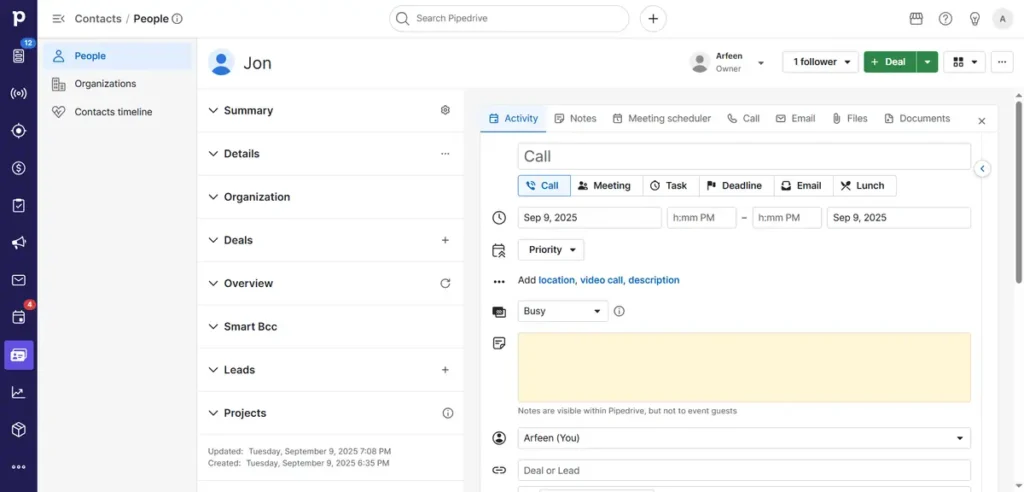
If you’re losing deals because your current system can’t track where prospects stand, you need a CRM that prioritizes your sales process over flashy features. your biggest Problem isn’t finding leads, it’s converting them consistently. Most small businesses lose 20-80% of potential sales because they can’t track follow-ups properly or deals fall through cracks in their system.
here’s what Pipedrive solves for your business: visual deal tracking that shows exactly where money sits in your pipeline. You can see which deals need immediate attention and Which prospects have gone cold. That’s the difference between guessing and knowing where your Next revenue comes From.
The platform focuses on deal Progression through customizable stages. You set up your sales process once, then every deal follows the same proven path. Your teams know exactly what actions to take at each stage no more wondering what’s next? with prospects.
I tested this with a fake consulting business. Created these stages: Initial Contact → Discovery Call → Proposal Sent → Negotiation → Closed Won/Lost. Added 15 random prospects in 3 days. The visual pipeline immediately showed me 3 proposals just sitting there (oops, forgot to follow up) and 2 discovery calls I’d scheduled but hadn’t contacted yet. That’s why visual pipeline management works so well for your business. You always know exactly where your deals stand and what needs attention next.
Pipedrive Pros & Cons
Pros:
- Increases deal closure rates through systematic follow-up
- Drag-and-drop visual pipeline management
- Email Outlook integration is actually good
- Activity reminders Forces you to schedule next steps
- Simple and lightweight interface
- AI sales assistant
Cons:
- Reporting requires higher-tier plans for advanced insights
- Basic customization options compared to enterprise solutions
- Limited marketing automation
- customer support is not very good
Pipedrive pricing
Unfortunately there is no free plan, but a 14-day free trial is available. And no credit card required. The Lite plan starts at $14/month. Included AI: Most growing small businesses need the Premium plan at $49 for adequate reporting and automation features. You should budget $100-500 monthly for a team of 10-20 users.
Should you choose Pipedrive?
You can choose Pipedrive if you’re focused on sales and want a CRM that makes pipeline management easy to use. The visual system works great for B2B businesses with longer sales cycles where you need to track multiple touchpoints.
Here’s how to know if it’s right for your business: your team struggles to stay organized with current sales tracking, and you want something simple that people will actually use. Plus, visual pipeline management appeals to how your brain works.
Skip Pipedrive if you need heavy marketing automation or advanced reporting. As far as I know, HubSpot or Zoho might serve your business better for those specific needs.
My guess would be that if you’re reading this, you probably need better sales organization more than fancy marketing features. With that in mind, Pipedrive helps your business get more done, faster. And that’s exactly what your growing business needs.
3. HubSpot: Best free CRM for small business with powerful features
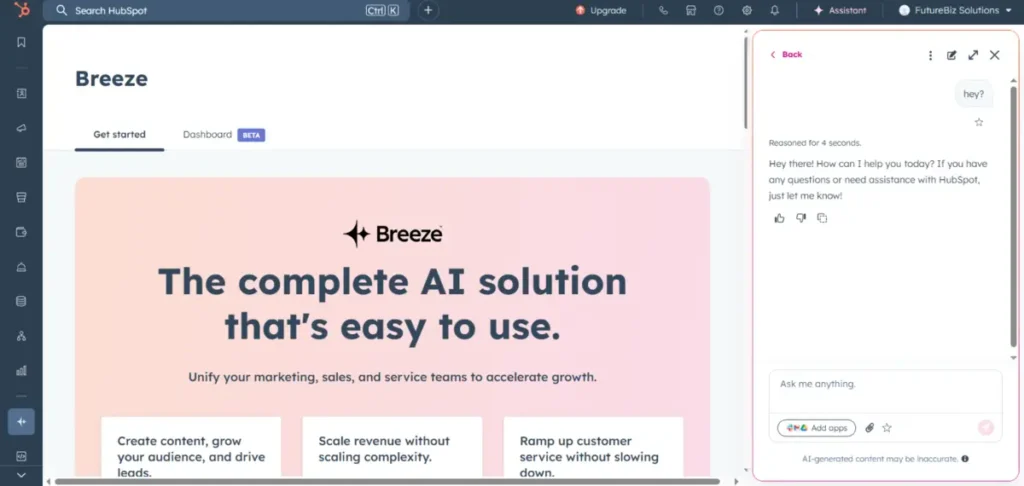
If you want a free CRM with powerful features, then HubSpot is your best option. You get contact management for up to 1 million contacts, deal tracking, and email marketing without paying anything.
And If you’re running Facebook ads or Google campaigns without knowing which ones bring real customers to your business, you’re burning money. HubSpot fixes this exact problem.
You maybe think you know which marketing channels work for your business. But here’s the thing connecting every dollar you spend to actual revenue. That’s why I use and recommend HubSpot—it shows you exactly which blog posts, emails, or ads bring paying customers.
Here’s what sets it apart: most free CRMs are limited trials that force you upgrades within weeks. But HubSpot gives you permanent access to core CRM functionality. Plus, you get live chat and meeting scheduling tools included.
The good thing starts happening when you realize you don’t need five different tools anymore. Your email marketing, social media posts, website forms, website builder, and sales pipeline all work together. Plus, your customer service team can see every interaction a client had with your business.
Here’s what you get for your business:
- Email marketing that actually connects to your sales
- Website tracking that shows you which pages convert visitors
- Social media scheduling tied to your business results
- Lead scoring that tells you when prospects are ready to buy
HubSpot Pros & Cons
Pros:
- Free version gives you more than most paid CRMs
- You can see your complete customer journey
- All-in-one platform
- Excellent educational resources
- Clean, beginner friendly interface
Cons:
- Advanced features cost serious money (we’re talking thousands)
- Limited customization on free plan
- Can get overwhelming if you use everything
HubSpot Pricing
You can start completely free with unlimited contacts. But if you want email marketing and automation, you’re looking at $45-$50 monthly minimum. Most growing businesses end up paying $800+ monthly for the features that actually move the needle. Keep in mind that HubSpot pricing can be confusing if you’re new.
Should You Choose HubSpot?
Choose HubSpot if your current setup can’t tell you which marketing efforts make you money. It’s particularly powerful if you’re already doing content marketing, email campaigns, or social media for your business. And the free version works well for businesses managing under 50 leads monthly. And it helps your business grow without upfront investment.
Skip HubSpot if you need advanced customization or want simple sales-focused CRM. As far as I know, Pipedrive offers better value for pure pipeline management. Plus, seems a better fit if you prefer straightforward sales tracking over marketing complexity.
4. Freshsales: Best small business CRM for customer service integration
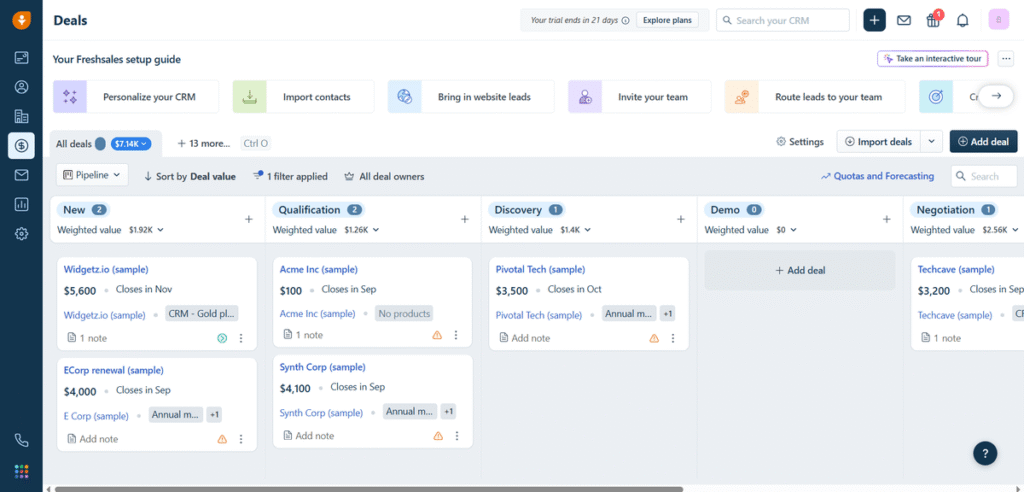
If you’re losing customers after the sale because your CRM doesn’t help with support issues, you need a platform that connects sales success to customer retention. Freshsales solves this critical gap.
It’s easy to assume closing the deal is your biggest challenge. But what’s actually hurting your business is customer churn because your sales and support teams work in silos. Here’s the problem—your CRM tracks prospects but ignores existing customers who could buy more.
Here’s what makes Freshsales different from typical sales-only CRMs: it connects your entire customer lifecycle. You can see a client’s purchase history, support tickets, and satisfaction scores in one place. That’s why your account managers can spot upselling opportunities while your support team prevents churn.
To see it in action, I tried Freshsales with my dummy service business contacts. The setup was smooth and took only 15 minutes. When I imported contacts from a spreadsheet, Freshsales automatically added extra details like company info and social profiles.
Things get exciting once you understand that you don’t need separate systems for sales and customer success. Your support team can see what promises your sales team made. Your sales team knows which customers are happy and ready for additional services.
Here’s what you get for your business:
- Built-in phone system that records and tracks all customer calls
- Email sequences that nurture leads automatically
- Lead scoring that identifies your hottest prospects
- Customer health scores that prevent churn before it happens
- Territory management that optimizes your sales team coverage
Freshsales Pros & Cons
Pros:
- Beautiful, clean Interface your team will actually enjoy using
- AI assistant (Freddy) insights that predict which deals will close
- Customer support integration that most CRMs completely miss
- Built-in calling features save you phone system costse
Cons:
- Limited customization compared to more expensive platforms
- Reporting features require higher-tier plans for useful insights
- Third-party integrations aren’t as extensive as competitors
Freshsales pricing
Free plan available for 3 users. And the growth plan starts at $9 per user monthly with basic features. The Pro plan at $39 gives you the AI insights and advanced reporting your business actually needs. You’re looking at $50-300 monthly for a small team.
Should you choose Freshsales?
You should pick Freshsales if your current CRM ignores customers after they buy from you. It’s particularly valuable if you rely on repeat business, upselling, or need tight sales-support coordination.
However, you might want simpler options if your business model is purely transactional without ongoing customer relationships. Freshsales shines when customer lifecycle management matters to your revenue.
My guess would be that if you’re currently using one tool for sales and another for customer support, Freshsales will improve both your close rates and customer retention through better information sharing.
5. Capsule CRM: Best CRM for small business simple and clean design
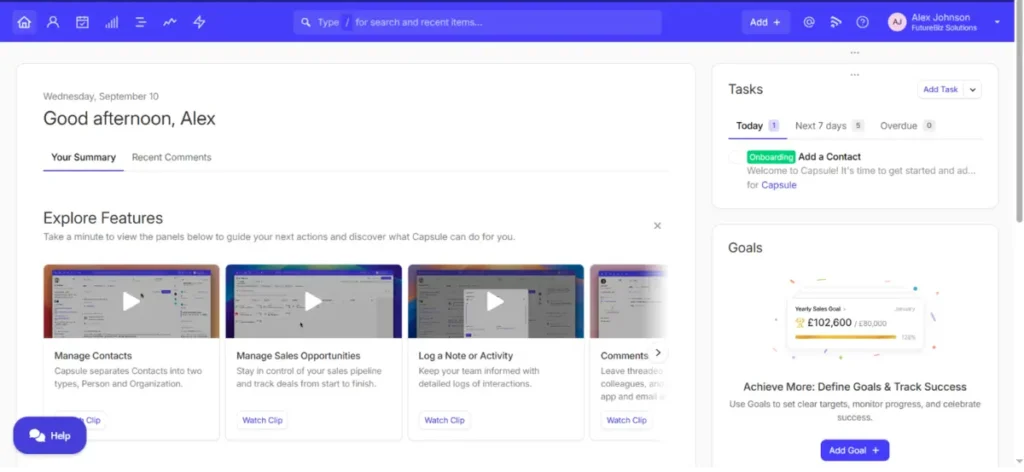
Capsule CRM reminded you why simple can be better. The interface is clean, loading is fast, and finding information takes seconds instead of minutes. There’s no learning challenge, you just start using it day one. sometimes less really is more.
You know what kills me about most CRMs? They’re built by engineers for engineers, not for people who just want to sell stuff. Your sales team shouldn’t need a computer science degree to track a lead.
That’s exactly what Capsule gets right. You can set it up in an afternoon and your team will know how to use it by dinner. No complicated workflows, no confusing dashboards—just clean, simple contact management that works.
What makes me recommend Capsule is how fast you can get productive. You import your contacts, set up a basic pipeline, and boom—you’re tracking deals. Your team focuses on selling instead of figuring out which button does what.
If you want a beautiful, simple CRM focused on relationship management rather than complex sales processes. then this works best for you
Here’s what you get for your business:
- Contact records that make sense immediately
- Pipeline view that shows your deals clearly
- Task reminders that keep you following up
- Email sync that captures conversations automatically
- Mobile app that works when you’re out meeting clients
Capsule CRM Pros & Cons
Pros:
- Your team will actually use it (that’s huge)
- Setup takes hours, not weeks
- Pricing won’t kill your budget
- Focus on relationships It designed to helps business
Cons:
- Limited marketing automation features
- Basic reporting compared to fancier platforms
- Fewer bells and whistles than competitors
Capsule Pricing:
Free plan available, professional starts at $18 per user monthly. Teams plan at $36 gives you better collaboration tools. Capsule offers good value for its target market. The free plan works fine for very small teams, but most businesses need professional for unlimited contacts and email integration.
Should You Choose Capsule CRM?
Choose Capsule if your biggest problem is getting your team to consistently use a CRM. It’s perfect for businesses that value simplicity over having every feature imaginable.
But if you need heavy marketing automation or complex reporting, you’ll want something more powerful. Capsule excels at being simple and reliable, not comprehensive.
With that in mind, if you’ve tried other CRMs that your team ignored or found too complicated, Capsule might finally give you a system that everyone will actually use daily.
6. Agile CRM: Best CRM for small business marketing automation

If you’re watching competitors automate their marketing while you manually send emails one by one, Agile CRM brings enterprise-level automation to your small business budget.
Most small businesses know they need marketing automation. The problem is platforms like HubSpot or Marketo cost more than your rent. You need something that delivers sophisticated automation without destroying your cash flow.
As far as I know, Agile CRM is one of the few platforms that gives you real marketing automation starting under $10 per user. You can set up drip campaigns, score leads, and track website behavior without taking out a business loan.
What works best for me about Agile is how it handles the complete marketing-to-sales handoff. Your website visitors get automatically tagged based on their behavior. Your email campaigns can trigger sales tasks. Your deals automatically update based on customer actions.
Agile CRM Pros & Cons
Pros:
- Full marketing automation at a fraction of competitor costs
- All-in-one approach eliminates multiple tool expenses
- Advanced features that usually require enterprise budgets
- Decent learning resources to get your team up to speed
Cons:
- Interface feels clunky compared to modern alternatives
- Customer support response times can frustrate urgent issues
- Some integrations require technical knowledge to set up properly
Agile CRM Pricing
Starter plan begins at $8.99 per user monthly. Regular plan at $29.99 gives you the automation features that actually matter.
Should You Choose Agile CRM
Choose Agile if you need marketing automation but can’t afford premium platforms. It’s particularly valuable if you’re currently doing email marketing manually or using basic tools that don’t connect to your sales process.
However, if budget isn’t your primary concern, you might prefer more polished alternatives. Agile delivers functionality over user experience – it works well but doesn’t always feel modern.
7. Salesforce: Best CRM for small business enterprise-level growth
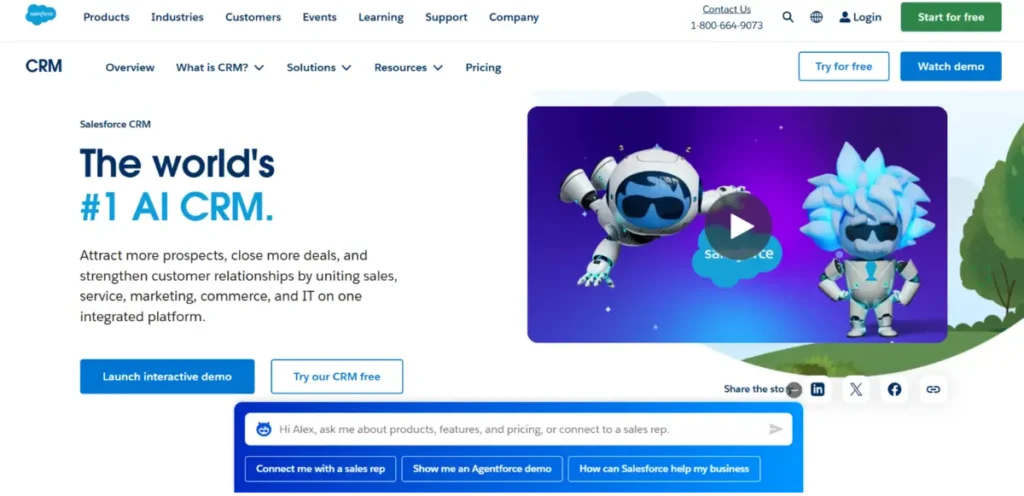
If you’re wondering whether you need the world’s #1 CRM, let me save you some time and money. Salesforce is incredibly powerful, but it’s probably overkill for your small business.
You’ve heard Salesforce runs half the Fortune 500 companies, right? Here’s what they don’t tell you—those companies have dedicated IT teams and unlimited budgets. You probably don’t.
I’ve seen too many small businesses get seduced by Salesforce’s reputation, then spend months trying to make it work for their simple needs. It’s like buying a Boeing 747 when you need a Honda Civic.
But here’s the thing—if you’re genuinely scaling fast and need enterprise-level customization, Salesforce delivers features that other CRMs can’t touch. Your business can literally build custom applications inside the platform. That’s either amazing or completely unnecessary, depending on your situation.
Salesforce Pros & Cons
Pros:
- Handles massive data volumes without breaking
- AI assistant (Einstein)
- Customizes to literally any business requirement
- Integrates with everything your company might use
- Scales from 10 to 10,000 users seamlessly
Cons:
- Learning curve is brutal—expect months of training
- Requires technical expertise or expensive consultants
- Pricing escalates quickly with features you actually need
- Over-engineered for simple sales processes
Salesforce Pricing
Essentials starts at $25 per user monthly but lacks most useful features. Professional at $75 is where it gets functional. Enterprise at $150 gives you the good stuff. You’re looking at $750-1,500 monthly for a small team, plus implementation costs.
Should You Choose Salesforce?
You should consider Salesforce only if you have complex sales processes, need extensive customization, or plan to grow beyond 50+ employees quickly. It makes sense for businesses with dedicated admin resources and enterprise-level requirements.
Skip it if you just need basic CRM functionality. You’ll spend more time configuring Salesforce than using it productively.
My honest advice? Unless you have specific enterprise needs that simpler CRMs can’t handle, you’ll get better ROI from platforms built for small businesses. Salesforce is a Ferrari in a world where most businesses need reliable transportation, not racing capability.
How We Selected the best CRM for small business
A CRM is one of the most important tools for your business. It holds all your customer data, tracks every deal you’re working on, and helps your team know what to do next. But here’s what’s important for small businesses: you don’t want something too basic that limits you later, but you also can’t afford enterprise pricing that kills your budget.
You need a tool that gives you control over your sales process while fitting your budget as you grow. Your team needs insights they can actually use, not complicated reports they’ll ignore.
Keeping that in mind, I tested and researched over 100 CRM platforms to find the best ones for your small businesses. I looked for tools that solve real problems you face—like forgetting to follow up with hot leads or losing track of important customer information.
Here’s exactly what I looked for when testing customer relationship management software for your business:
Evaluation Criteria
Is this made for your business? (Target audience fit 25%)
Most CRMs are made for huge companies or tiny startups. Nothing for businesses like yours. I tested which ones work for small businesses—something simple but that can grow with you. can your team use this without calling tech support? Does it solve problems when you’re making $500K-$2M per year?
Will your team really use it every day? (Usability & user experience 20%)
I’ve seen companies spend $50,000 on CRM software that nobody touches. Cool features don’t matter if your sales team hates using it. I put in real customer lists and set up sales tracks just like you would. Some tools made simple stuff take forever. Others felt easy from day one.
Do the basic things work (Core CRM functionality 20%)
Every CRM says they handle contacts, deals, and reminders. But there’s a big difference between them. It works, and it helps you sell more. I tested everyday stuff your team needs. How fast can you find a customer’s info? Does the deal view show you what’s happening? Do the reminders make sense?
What will really cost you (Pricing & value 20%)
That $15/month price is usually fake. I figured out real costs, including setup time, training, and the stuff you actually need. A cheap CRM that takes weeks to set up costs way more than something that works day one. I also checked what happens when you need more users or better features. Some companies trick you with low starting prices and then hit you with crazy upgrade costs.
What makes each platform worth choosing (feature specialization 15%)
No CRM is perfect at everything. The good ones are really good at specific things that matter for different businesses. Some are excellent at showing your sales pipeline. Others connect all your business tools. Some just focus on being super easy to use. I tested which tool works best for different business needs.
What to Look for in a Small Business CRM
Let me break down what you should actually care about when choosing a CRM for your business:
- Artificial intelligence (AI): Look for practical AI like lead scoring and automated data entry. Skip the fancy AI features that sound cool but don’t impact your revenue directly
- Contact management: Your CRM should sync with Gmail or Outlook automatically and track conversation history without extra work
- Sales pipeline: You need visual pipeline management where you can drag deals between stages and spot bottlenecks quickly
- Reporting & analytics: Custom dashboards and real-time data visualizations let you monitor performance and forecast sales trends
- Customization: You need a CRM that adapts to your business process, not the other way around. But here’s the thing – too much customization becomes a nightmare
- User-friendly interface: Your CRM ****should easy to use and beginner friendly interface
- Mobile access: A fully functional mobile app lets your team access customer data and manage tasks wherever they are
- Integrations: Seamless connections with Gmail/Outlook, calendars, phones, social media, accounting & marketing tools reduce manual work and improve your data flow
- Automation: Automate repetitive tasks—follow-ups, lead assignments, email reminders, meeting scheduling—to free up time
- Pricing: Watch out for platforms with low starting prices but expensive upgrades for basic functionality. you want transparent pricing that scales reasonably with your team size.
How to Choose the right CRM for a Small business
Choosing the right CRM can feel overwhelming, but I break it into a step-by-step guide to make it easier for you. Here’s a simple framework you can follow:
Find your biggest problem first
If you think you need every fancy feature these companies advertise. But what’s important is solving the problem that’s actually costing you money right now.
If you are just getting started with CRM, go with HubSpot’s free plan. Learn the basics without spending money.
If you’re losing deals from poor follow-up, go with Pipedrive. The visual pipeline shows exactly which prospects need attention and when. You can see if someone’s been sitting on a proposal sent for two weeks without contact.
Paying for tools that don’t talk to each other: Zoho CRM replaces 3-4 separate apps. When you close a deal, it creates an invoice automatically. No more entering the same customer info everywhere.
If you need something your team will actually use: Capsule CRM work day one. No training problems or complex setup required.
Want marketing and sales together? HubSpot connects your blog posts, emails, and deals. You’ll see exactly which marketing brings real customers instead of just website visits.
Here’s the thing—the CRM that solves your biggest pain point is worth way more than the one with features you’ll never touch.
Consider your team tech skills
The best CRM in the world is useless if your team won’t use it. You know your team better than me. If you’ve got tech-savvy people who love trying new software, something like Zoho CRM might work great. But if your team barely tolerates email, you need something dead simple like Capsule CRM.
I’m not sure why, but business owners always overestimate how much their team will embrace new technology. You’ve probably seen companies buy powerful CRMs that sit empty because nobody wants to learn yet another system.
It seems a better fit if you choose based on who’s actually going to use it every day, not who you think your team should be.
Test with real data
Here’s what I actually did during testing and what you should do:
Week 1: Import 50 real contacts and create 5-10 sample deals. Set up email sync.
Week 2: Use only this CRM for all customer work. No cheating with spreadsheets.
Week 3: Check if anyone’s avoiding it or complaining about simple tasks taking forever.
Red flags I found: Skip any CRM where setup takes hours, the mobile app feels slow, or your team keeps asking, “How do I…” for basic stuff.
Calculate your real costs
This is actually pretty good advice that will save you thousands: when you see $12/month per user, that’s not what you’ll actually pay. Your real cost includes setup, training, integrations with your email and calendar, extra storage, and all those premium features you’ll need later.
I always tell people to budget 2-3x the advertised price for the first year. A $20/month CRM quickly becomes $60/month when you add the features that make it actually useful for your business.
Start small and Grow
Choose a CRM that can handle your current needs plus maybe 50% growth. Don’t pay for enterprise features you won’t use for years, but make sure you can upgrade without switching systems completely. I’ve found that businesses change faster than they expect. The CRM that works for 5 employees might not work for 15. Pick something that can scale with your success.
Stop Overthinking This
You know what kills me? Small business owners spend weeks researching the “perfect” CRM while losing actual deals because they have no tracking system at all.
Here’s the truth: any of my top picks will improve your business immediately. The CRM you actually use beats the perfect CRM you never buy.
As far as I know, most businesses outgrow their first CRM within 2-3 years anyway. That’s normal. Don’t stress about finding the perfect forever solution.
With that in mind, pick something good enough and start tracking customers properly. You can always switch later when you know exactly what you need. Your future deals will thank you for taking action instead of endless research.
Frequently Asked Questions (FAQs)
What Is CRM (Customer Relationship Management)?
A CRM is a software that helps you track leads, and manage contact information for your customers, find sales opportunities, manage marketing campaigns, see conversation history, deal status, follow-up reminders. and more—everything in one place
Think of it as your business memory. You can see exactly when you last talked to a prospect, what you discussed, and what needs to happen next. That’s why CRMs help you close more deals and keep customers happy.
What is the best CRM software for small business?
The best CRM software is Zoho CRM the best overall choice for most small businesses. You get comprehensive features at $14/month that can replace 3-4 separate business tools.
But here’s the thing—the best CRM depends on your specific need:
If you need need sales tracking: Pipedrive
Want something free: HubSpot
Love clean design: Capsule CRM
You need marketing automation but cheap: Agile CRM
What is the simplest CRM?
Capsule CRM is the simplest CRM right now, Clean interface, quick setup, and your team can start using day one without training sessions.
HubSpot comes second. But more features than Capsule but still intuitive enough that you won’t need a manual to figure out basic tasks.
Is there a 100% free CRM?
Yes, HubSpot offers a completely free CRM with no time limits. You get unlimited contacts, basic deal tracking, email integration, and even some marketing tools.
The catch? Advanced features cost money. But the free version handles most small business needs perfectly. I’ve seen companies run successfully on HubSpot’s free plan for years.
Other free options: Zoho CRM (3 users), Freshsales (3 users), but these have more limitations than HubSpot free plan.
